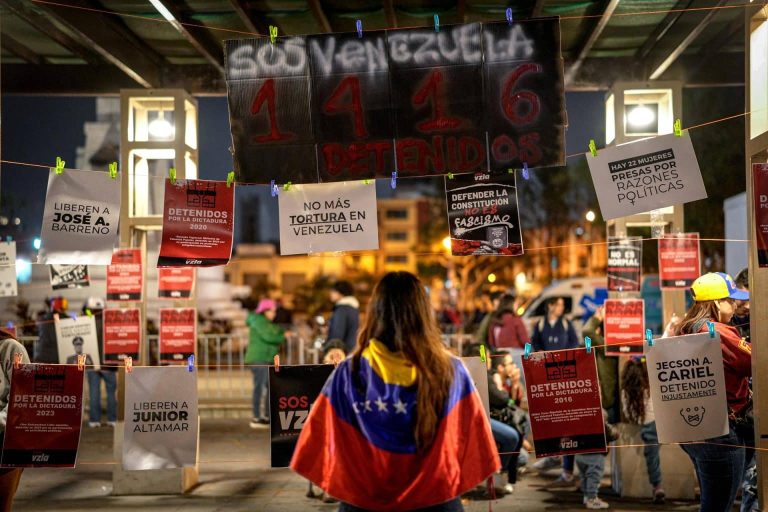27 de agosto 2024

Children of Exile: The Births “Sowing Hope” in the Camp of Nicaraguan Farmers

PUBLICIDAD 1M
PUBLICIDAD 4D
PUBLICIDAD 5D
The Venezuelan Supreme Court’s certification of sham election results amounts to a coup d’etat against the people’s sovereignty

Inside and outside their country, Venezuelans continue to demand recognition of their candidate's victory in the July 28, 2024 elections, and the international community should not fail to present the same demand to Nicolás Maduro. // Photo: EFE/ John Reyes
The electoral fraud that was consummated after the polls closed in Venezuela on the night of July 28th, has now been transformed into a cynical and unacceptable coup d’etat against the popular will.
Four weeks have now passed since the Venezuelan National Electoral Council – an institution under the thumb of the government – proclaimed the non-existent reelection of Nicolas Maduro in the presidential race. Then on Thursday, August 22nd, Venezuela’s Supreme Court, another gear in the official machinery, issued a shameful declaration “certifying beyond any objections” the sham results.
In addition, the Supreme Court declared the opposition candidate, Edmundo Gonzalez Urrutia – who has documented an electoral victory with almost 70% of the votes – in “contempt” and “disobedience.” The Court then asked the Public Prosecutor’s office, yet another institution that lacks independence, to file charges against those who published the precinct-by-precinct voting tallies, documenting Edmundo Gonzalez’ victory.
The Supreme Court lacks jurisdiction over electoral matters, so its decision is invalid, even in the context of the precarious Venezuelan “legality.” However, the most serious issue isn’t that they overstepped their role, but that the proclaimed “certification” lacks any factual evidence to support it. On the contrary, the National Electoral Council never made public the printed voting records, polling place by polling place, nor has it accepted an independent audit.
The Supreme Court ignored this situation, referring simply to the “electoral material assessed” as the basis for validating the results announced by the electoral organ. According to these bodies, Maduro won with 52% of the votes.
The maneuver surprised no one, and with it the regime has revealed openly and with absolute brazenness their decision to entrench themselves in power with no legitimacy whatsoever. This, unfortunately, augurs a period of repression yet more ferocious than that unleashed up until July 28th, because only through the systematic and brutal exercise of control, using threats, fear, reprisals and violence, will it be able to suffocate the public’s outcry. All over the world, all of us who support democracy should strive to impede this.
The rejection of the electoral results was immediate in Latin America, the United States and Europe. The governments of Bolivia, Cuba, Honduras, and Nicaragua have been complicit ever since the fraudulent results were announced and insist on recognizing Maduro’s reelection. Beyond that, reactions have oscillated between the condemnation of the majority and the calculated silence or extreme prudence of a few.
Just minutes after the Supreme Court made their announcement, Gabriel Boric, Chile’s socialist president, called it the consolidation of a fraud. He added: “there’s no doubt that we’re standing before a dictatorship that falsifies elections, represses those who think differently, and remains indifferent in the face of the largest exile population in the world, comparable only to that of Syria which was the outgrowth of a war.”
Along with Chile, the governments of Costa Rica, Argentina, Ecuador, the United States, Guatemala, Paraguay, Peru, the Dominican Republic, and Uruguay on Thursday, August 22nd ratified their “refusal to accept the declaration” of Venezuela’s Electoral Council and reiterated that “only an impartial and independent audit” of the votes and precinct tallies “would allow guarantees of the popular will and democracy in Venezuela.” Spain has maintained a similar position: they won’t recognize Maduro unless they make the individual voting reports public. The European Union has said essentially the same thing.
Andres Manuel Lopez Amador, Mexico’s president, broke off his deliberate ambiguity and declared that he would suspend any recognition of the results until “the detailed records are released.” Brazil and Colombia, who have tried in vain to promote negotiations between the Venezuelan government and the opposition, hasn’t yet issued a conclusive statement, nor has El Salvador. In the face of the regime’s now-official inflexibility, the correct follow-up is for them to denounce and reject the Supreme Court’s declaration, because it’s obvious that Maduro and his operators manipulated the Court to buy time.
It’s also obvious that, if the government hasn’t divulged the precinct tally sheets until now, nor permitted an impartial audit, they’re even less likely to do so after Thursday’s court declaration. The moment has come to wait no more; or, at least, to set a very decisive deadline for total transparency. Otherwise, and without hesitation, the results should be rejected. Maduro should be denied legitimacy, and Gonzalez should be given direct backing as the winner. This action should be immediately followed by effective support for the opposition and the imposition of severe sanctions against the dictatorship.
We are faced with nothing less than an aggravated coup d’etat, because the government has acted not only against an institutional structure that is, in itself, extremely precarious, but also against the exercise of the popular will. The events have been more than well documented. In consequence, action must be taken.
——-
This article is an editorial by Costa Rican newspaper La Nación. It was published in Spanish by Confidencial and translated by Havana Times. To get the most relevant news from our English coverage delivered straight to your inbox, subscribe to The Dispatch.
PUBLICIDAD 3M
Diario costarricense, fundado en 1946. Su primera versión electrónica (nación.com) se publicó en abril de 1995. Desde junio de 2015 implementa un sistema de suscripción digital.
PUBLICIDAD 3D